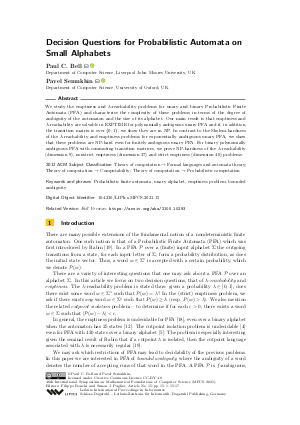Decision Questions for Probabilistic Automata on Small Alphabets
Authors
Paul C. Bell  ,
Pavel Semukhin
,
Pavel Semukhin 
-
Part of:
Volume:
46th International Symposium on Mathematical Foundations of Computer Science (MFCS 2021)
Part of: Series: Leibniz International Proceedings in Informatics (LIPIcs)
Part of: Conference: Mathematical Foundations of Computer Science (MFCS) - License:
 Creative Commons Attribution 4.0 International license
Creative Commons Attribution 4.0 International license
- Publication Date: 2021-08-18
File

PDF
LIPIcs.MFCS.2021.15.pdf
- Filesize: 0.71 MB
- 17 pages
Document Identifiers
Related Versions
- Full Version https://arxiv.org/abs/2105.10293
Subject Classification
ACM Subject Classification
- Theory of computation → Formal languages and automata theory
- Theory of computation → Computability
- Theory of computation → Probabilistic computation
Keywords
- Probabilistic finite automata
- unary alphabet
- emptiness problem
- bounded ambiguity
Metrics
- Access Statistics
-
Total Accesses (updated on a weekly basis)
0Document
0Metadata
Abstract
We study the emptiness and λ-reachability problems for unary and binary Probabilistic Finite Automata (PFA) and characterise the complexity of these problems in terms of the degree of ambiguity of the automaton and the size of its alphabet. Our main result is that emptiness and λ-reachability are solvable in EXPTIME for polynomially ambiguous unary PFA and if, in addition, the transition matrix is over {0, 1}, we show they are in NP. In contrast to the Skolem-hardness of the λ-reachability and emptiness problems for exponentially ambiguous unary PFA, we show that these problems are NP-hard even for finitely ambiguous unary PFA. For binary polynomially ambiguous PFA with commuting transition matrices, we prove NP-hardness of the λ-reachability (dimension 9), nonstrict emptiness (dimension 37) and strict emptiness (dimension 40) problems.
Cite As Get BibTex
Paul C. Bell and Pavel Semukhin. Decision Questions for Probabilistic Automata on Small Alphabets. In 46th International Symposium on Mathematical Foundations of Computer Science (MFCS 2021). Leibniz International Proceedings in Informatics (LIPIcs), Volume 202, pp. 15:1-15:17, Schloss Dagstuhl – Leibniz-Zentrum für Informatik (2021)
https://doi.org/10.4230/LIPIcs.MFCS.2021.15
BibTex
@InProceedings{bell_et_al:LIPIcs.MFCS.2021.15,
author = {Bell, Paul C. and Semukhin, Pavel},
title = {{Decision Questions for Probabilistic Automata on Small Alphabets}},
booktitle = {46th International Symposium on Mathematical Foundations of Computer Science (MFCS 2021)},
pages = {15:1--15:17},
series = {Leibniz International Proceedings in Informatics (LIPIcs)},
ISBN = {978-3-95977-201-3},
ISSN = {1868-8969},
year = {2021},
volume = {202},
editor = {Bonchi, Filippo and Puglisi, Simon J.},
publisher = {Schloss Dagstuhl -- Leibniz-Zentrum f{\"u}r Informatik},
address = {Dagstuhl, Germany},
URL = {https://drops.dagstuhl.de/entities/document/10.4230/LIPIcs.MFCS.2021.15},
URN = {urn:nbn:de:0030-drops-144559},
doi = {10.4230/LIPIcs.MFCS.2021.15},
annote = {Keywords: Probabilistic finite automata, unary alphabet, emptiness problem, bounded ambiguity}
}
Author Details
References
-
S. Akshay, Timos Antonopoulos, Joël Ouaknine, and James Worrell. Reachability problems for Markov chains. Information Processing Letters, 115(2):155-158, 2015.

-
Paul C. Bell. Polynomially ambiguous probabilistic automata on restricted languages. In International Colloquium on Automata, Languages, and Programming, number 105 in ICALP'19, pages 1-14, 2019.

-
Paul C. Bell and P. Semukhin. Decidability of cutpoint isolation for probabilistic finite automata on letter-bounded inputs. In International Conference on Concurrency Theory, number 22 in CONCUR'20, pages 1-16, 2020.

-
A. Bertoni, G. Mauri, and M. Torelli. Some recursively unsolvable problems relating to isolated cutpoints in probabilistic automata. In Automata, Languages and Programming, volume 52, pages 87-94, 1977.

-
V. Blondel and V. Canterini. Undecidable problems for probabilistic automata of fixed dimension. Theory of Computing Systems, 36:231-245, 2003.

-
V. D. Blondel and N. Portier. The presence of a zero in an integer linear recurrent sequence is NP-hard to decide. Linear Algebra and its Applications, pages 91-98, 2002.

-
L. Daviaud, M. Jurdzinski, R. Lazic, F. Mazowiecki, G. A. Pérez, and J. Worrell. When is containment decidable for probabilistic automata? In International Colloquium on Automata, Languages, and Programming, number 121 in ICALP'18, pages 1-14, 2018.

-
N. Fijalkow, C. Riveros, and J. Worrell. Probabilistic automata of bounded ambiguity. In 28th International Conference on Concurrency Theory (CONCUR), pages 19:1-19:14, 2017.

- S. Friedland. Matrices: Algebra, Analysis and Applications. World Scientific Publishing Company Pte Limited, 2015. URL: https://books.google.co.uk/books?id=y8fACwAAQBAJ.
-
H. Gimbert and Y. Oualhadj. Probabilistic automata on finite words: decidable and undecidable problems. In International Colloquium on Automata, Languages and Programming (ICALP'10), volume 2, pages 527-538, 2010.

-
V. Halava, T. Harju, M. Hirvensalo, and J. Karhumäki. Skolem’s problem - on the border between decidability and undecidability. In TUCS Technical Report Number 683, 2005.

-
M. Hirvensalo. Improved undecidability results on the emptiness problem of probabilistic and quantum cut-point languages. SOFSEM 2007: Theory and Practice of Computer Science, Lecture Notes in Computer Science, 4362:309-319, 2007.

-
R. A. Horn and C. R. Johnson. Topics in matrix analysis. Cambridge University Press, 1991.

-
O. Ibarra and B. Ravikumar. On sparseness, ambiguity and other decision problems for acceptors and transducers. In Proc. STACS 1986, volume 210, pages 171-179, 1986.

-
S. C. Kleene. Representation of events in nerve nets and finite automata. Automata Studies, Annals of Mathematical Studies, 34, 1956.

-
K. L. Manders and L. Adleman. NP-complete decision problems for binary quadratics. Journal of Computer and System Sciences, 16:168-184, 1978.

-
J. Ouaknine and J. Worrell. Positivity problems for low-order linear recurrence sequences. In Proceedings of the Twenty-Fifth Annual ACM-SIAM Symposium on Discrete Algorithms, SODA'14, pages 366-379, SODA, 2014.

-
A. Paz. Introduction to Probabilistic Automata. Academic Press, 1971.

-
M. O. Rabin. Probabilistic automata. Information and Control, 6:230-245, 1963.

-
C. Reutenauer. Propertiétés arithmétiques et topologiques de séries rationnelles en variables non commutatives. Thèse troisième cycle, Université Paris VI, 1977.

-
P. Turakainen. Generalized automata and stochastic languages. Proceedings of the American Mathematical Society, 21:303-309, 1969.

-
N. K. Vereshchagin. The problem of appearance of a zero in a linear recurrence sequence (in russian). Mat. Zametki, 38(2), 1985.

-
A. Weber and H. Seidl. On the degree of ambiguity of finite automata. Theoretical Computer Science, 88(2):325-349, 1991.

